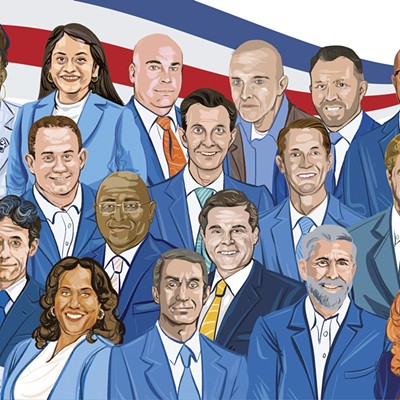Wednesday, August 15, 2012
After voter ID setback, attorneys pledge appeal
"It's not the evidence. It's the standard of review."
So said Penda Hair, one of the attorneys who sought to topple the state's Voter ID bill, of a Commonwealth Court ruling upholding the law. That may sound like the legal equivalent of the Pirates blaming an 11-0 loss on a badly drawn strike zone. But Hair's claim will be the basis for the next court battle.
Hair -- who'd previously called her side's case a "slam dunk" -- and other attorneys spoke with reporters on a conference call a few moments ago. They've vowed to file an appeal of the decision by tomorrow; the Supreme Court could have a ruling in as little as a month, though the timing "is completely up to them," acknowledged attorney Jennifer Clarke.
That appeal will argue that Judge Robert Simpson's ruling erred by applying the wrong standard when reviewing the law.
Hair and other attorneys argued that Simpson should have used the standard of "strict scrutiny" to weigh the facts. "Strict scrutiny" is applied to government action where fundamental rights -- like the right to vote -- are at stake. And it typically puts the burden on the government to prove a law is necessary. Given that attorneys for the state had already acknowledged a near-total lack of evidence of voter fraud, Hair and others felt confident that they would prevail using a "strict scrutiny" yardstick.
"That just goes to show that you should never predict what a court is going to do," Hair said sheepishly.
Simpson's ruling invoked a 2008 US Supreme Court ruling, rulings in other cases, and a nearly century-old Pennsylvania case, to give state legislators broad deference in drafting bills. (As for House Republican Leader Mike Turzai's notorious claim that the measure would help elect Mitt Romney this Novemeber? Simpson, while calling the remarks "disturbing," shrugged them off: "I declined to infer that other members of the General Assembly shared the boastful views," he wrote. And anyway, he added, if there are valid reasons for a law, dubious motives on behalf of those who back it don't necessarily invalidate it.) That put the burden on plaintiffs seeking to topple the law.
"If strict scrutiny applied in this case," explained ACLU attorney Vic Walczak, "the government would have to say, 'We really really need this law because of 'x.'" Instead, "When you're dealing with the lower-level scrutiny that the court applied here, the burden is much more on the individuals."
Indeed, Simpson quoted precedents that Simpson's ruling acknowledges that "if strict scrutiny is to be employed, I might reach a different determination."
Or not. Other portions of Simpson's ruling seem hostile to some of the evidence presented by Walczak's side. As noted here earlier, Simpson suggested plaintiffs had inflated estimates of the number voters lacking ID, rejecting expert testimony on the potential law's impact. And while Simpson credited the lawyers for doing "an excellent job of 'putting a face' to those burdened by the voter ID requirement," it wasn't good enough.
"I am not convinced [those who testified] will not have their votes counted in the general election," he wrote.









